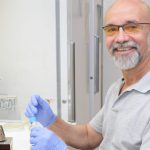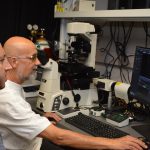Jonathan D. Wren, Ph.D.
Professor
Genes & Human Disease Research Program
Adjunct Associate Professor, Departments of Biochemistry & Physiology, Neuroscience and Geriatric Medicine, University of Oklahoma Health Sciences Center
Member, Stephenson Cancer Center, OUHSC
My 101
Many scientific questions can be answered with the vast amount of data that already exists. The overarching goal of my laboratory is to develop bioinformatics and artificial intelligence (AI) based methods to accelerate the pace of scientific discovery.
One long-term area of research interest is to develop effective ways of modelling the current state of scientific knowledge. Scientific publications have been growing in number at an exponential rate (42M in 2026, growing 5%/yr) and also in size with more supplementary data. It’s far too vast for one person to be familiar with any more than a tiny subset, so we have developed computational methods to model, summarize, and synthesize the fundamental relationships between things of interest within it (e.g., genes, diseases, chemicals, mutations, etc).
Research
Many scientific questions can be answered with the vast amount of data that already exists. The overarching goal of my laboratory is to develop bioinformatics and artificial intelligence (AI) based methods to accelerate the pace of scientific discovery.
One long-term area of research interest is to develop effective ways of modelling the current state of scientific knowledge. Scientific publications have been growing in number at an exponential rate (42M in 2026, growing 5%/yr) and also in size with more supplementary data. It’s far too vast for one person to be familiar with any more than a tiny subset, so we have developed computational methods to model, summarize, and synthesize the fundamental relationships between things of interest within it (e.g., genes, diseases, chemicals, mutations, etc).
The ability to create these “knowledge networks” is useful by itself, but also a critical predecessor to understanding what is going on at the molecular level in disease. For example, humans have ~25,000 protein-coding genes and ~30,000 non-coding RNA transcripts, yet we still know little or nothing about the functions of half of them. Even though we know the genomic location and sequence of each transcript and have experimental data on the expression, this illustrates the primary problem we are attempting to solve: Having data is not the same thing as having knowledge. So, we have developed methods to use transcriptional correlation networks combined with literature networks to predict the functions of these unknown genes, and experimental validation studies have shown it is approximately 85% accurate.
A new age of AI was ushered in with the invention of Transformer technology, which underlies the success of Large Language Models such as ChatGPT, as well as de novoprotein structure prediction models such as AlphaFold2. In brief, it permitted neural network-based models to “pay attention” to non-local features such as words said in previous sentences or amino acids in a different part of a protein’s sequence. Importantly, this new generation of AI has solved problems that previously bottlenecked progress, allowing us to now focus on higher-level issues, such as what might be called “synthetic understanding”. Take, for example, an image-generation program like DALL-E where you type words to generate an image of a cat. From analysis of millions of labelled cat pictures, it can intelligently blend the words you provide to determine the arrangement and color of pixels, such that it “understands” things like size, color, pose, breed, etc. Just as AI can understand the essence of “cat-ness”, it should be able to similarly understand the essence of “Alzheimer-ness”, or most any disease. We are currently working on AI-based approaches to do exactly this, which should allow us to model potential interventions and predict patient outcome faster and cheaper.
Brief CV
Education
B.B.A., University of Oklahoma, 1991
B.S., University of Oklahoma, 1996
Ph.D., University of Texas Southwestern Medical Center, 2003
Honors and Awards
NIH Institutional Training Grant Award in Genomic Science, 1999
Scientific Advisory Board, eTexx Biopharmaceuticals, Inc., 2003-present
Board of Directors, MCBIOS, 2003-2014
President, Oklahoma Bioinformatics Society (OKBIOS), 2004-2008
President, MidSouth Bioinformatics Society (MCBIOS), 2007-2008
MCBIOS Outstanding Service Award, 2011, 2019
Associate Editor, Bioinformatics, 2005-2026
Other Activities
Ad hoc reviewer for numerous scientific journals; co-organizer and participant for our campus-wide Data Science Workshop series; grant reviewer NIH & NSF bioinformatics grants
Memberships
International Society for Computational Biology, 1998-present
Mid-South Computational Biology and Bioinformatics Society, 2003-present
Joined OMRF scientific staff in 2007
Publications
Recent Publications
Ding Y, Chen J, Liu S, Hays JM, Gu X, Wren JD, Georgescu C, Reuter DN, Liu B, He F, Wang X, Wei Q, Wang J, Subramaniyan B, Wu Z, Kodali K, Reagan AM, Freeman WM, Miranti CK, Csiszar A, Ungvari Z, Mehla K, Walters MS, Elliott MH, Peng J, Kanie T, Papin JF, Hays FA, Zhang XA. Publisher Correction: Tetraspanin-enriched membrane domains regulate vascular leakage by altering membrane cholesterol accessibility to balance antagonistic GTPases. Nat Cardiovasc Res, 2025 August, PMID: 40841835
Porter HL, Ansere VA, Undi RB, Hoolehan W, Giles CB, Brown CA, Stanford D, Huycke MM, Freeman WM, Wren JD. Methylation array signals are predictive of chronological age without bisulfite conversion. Geroscience, 2025 July, PMID: 40721571
Ding Y, Chen J, Liu S, Hays JM, Gu X, Wren JD, Georgescu C, Reuter DN, Liu B, He F, Wang X, Wei Q, Wang J, Subramaniyan B, Wu Z, Kodali K, Reagan AM, Freeman WM, Miranti CK, Csiszar A, Ungvari Z, Mehla K, Walters MS, Elliott MH, Peng J, Kanie T, Papin JF, Hays FA, Zhang XA. Tetraspanin-enriched membrane domains regulate vascular leakage by altering membrane cholesterol accessibility to balance antagonistic GTPases. Nat Cardiovasc Res, 2025 July, PMID: 40731107
Selected Publications
Buckley DA, Jennings EM, Burke NN, Roche M, McInerney V, Wren JD, Finn DP, McHugh PC. Erratum to: The Development of Translational Biomarkers as a Tool for Improving the Understanding, Diagnosis and Treatment of Chronic Neuropathic Pain. Mol Neurobiol. 2017 Jul 1. PMID: 28669124 PMCID: PMC4960984
Siefert JC, Georgescu C, Wren JD, Koren A, Sansam CL. DNA replication timing during development anticipates transcriptional programs and parallels enhancer activation. Genome Res. 2017 May 16. pii: gr.218602.116. PMID: 28512193 PMCID: PMC5538556
Unnikrishnan A, Jackson J, Matyi SA, Hadad N, Wronowski B, Georgescu C, Garrett KP, Wren JD, Freeman WM, Richardson A. Role of DNA methylation in the dietary restriction mediated cellular memory. Geroscience. 2017 May 5. PMID: 28477138 PMCID: PMC5505897
Ziegler J, Pody R, Coutinho de Souza P, Evans B, Saunders D, Smith N, Mallory S, Njoku C, Dong Y, Chen H, Dong J, Lerner M, Mian O, Tummala S, Battiste J, Fung KM, Wren JD, Towner RA. ELTD1, an effective anti-angiogenic target for gliomas: preclinical assessment in mouse GL261 and human G55 xenograft glioma models. Neuro Oncol. 2017 Feb 1;19(2):175-185. PMID: 27416955 PMCID: PMC5464087
Kushwaha G, Dozmorov M, Wren JD, Qiu J, Shi H, Xu D. Hypomethylation coordinates antagonistically with hypermethylation in cancer development: a case study of leukemia. Hum Genomics. 2016 Jul 25;10 Suppl 2:18. PMID: 27461342 PMCID: PMC4965721
Hadad N, Masser DR, Logan S, Wronowski B, Mangold CA, Clark N, Otalora L, Unnikrishnan A, Ford MM, Giles CB, Wren JD, Richardson A, Sonntag WE, Stanford DR, Freeman W. Absence of genomic hypomethylation or regulation of cytosine-modifying enzymes with aging in male and female mice. Epigenetics Chromatin. 2016 Jul 13;9:30. eCollection 2016. PMID: 27413395 PMCID: PMC4942942
Contact
Genes & Human Disease Research Program, MS 42
Oklahoma Medical Research Foundation
825 N.E. 13th Street
Oklahoma City, OK 73104
Phone: (405) 271-6989
Fax: (405) 271-4110
E-mail: Jonathan-Wren@omrf.org
For media inquiries, please contact OMRF’s Office of Public Affairs at news@omrf.org.
Lab Staff
Constantin Georgescu, Ph.D.
Staff Scientist
Cory Giles, Ph.D.
Bioinformatics Scientist
Hunter Porter, Ph.D.
Postdoctoral Scientist
p>Mateusz Szczepaniak
Bioinformatics Scientist
p>Srividya Kottapalli
Graduate Student
p>Michael Van Der Veldt
Graduate Student
Susan "Suzy" Collins
Project Coordinator II
News from the Wren lab

The National Institutes of Health has awarded two grants worth a total of $26.3 million to OMRF for research into anthrax and to help train new scientists. Each grant will allow scientists to continue research started in 2004 and 2005 and keep them working through 2014 on several interconnected projects. In the first project, a $14.5 […]
Much like the world of college essays, scientific journals are often plagued with authors trying to publish someone else’s work as their own. For Oklahoma Medical Research Foundation scientist Jonathan Wren, Ph.D., the issue hit home as part of his duties as an editor for the journal Bioinformatics, when a reviewer recognized a paper as […]
Rare is the scientific paper today written by a single author. With research being conducted by teams of scientists, most studies now boast a half-dozen or so authors. According to a new study led by a scientist at the Oklahoma Medical Research Foundation, credit for those papers is far from evenly distributed, and the order […]
The Oklahoma Medical Research Foundation today announced the addition of four scientists to the faculty of its Arthritis & Immunology Research Program. The four new faculty members are Patrick Gaffney, M.D., Kathy Moser, Ph.D., Jonathan Wren, Ph.D., and Igor Dozmorov, Ph.D. “Their recruitment gives us a depth of scientific commitment and expertise that is unparalleled […]





















